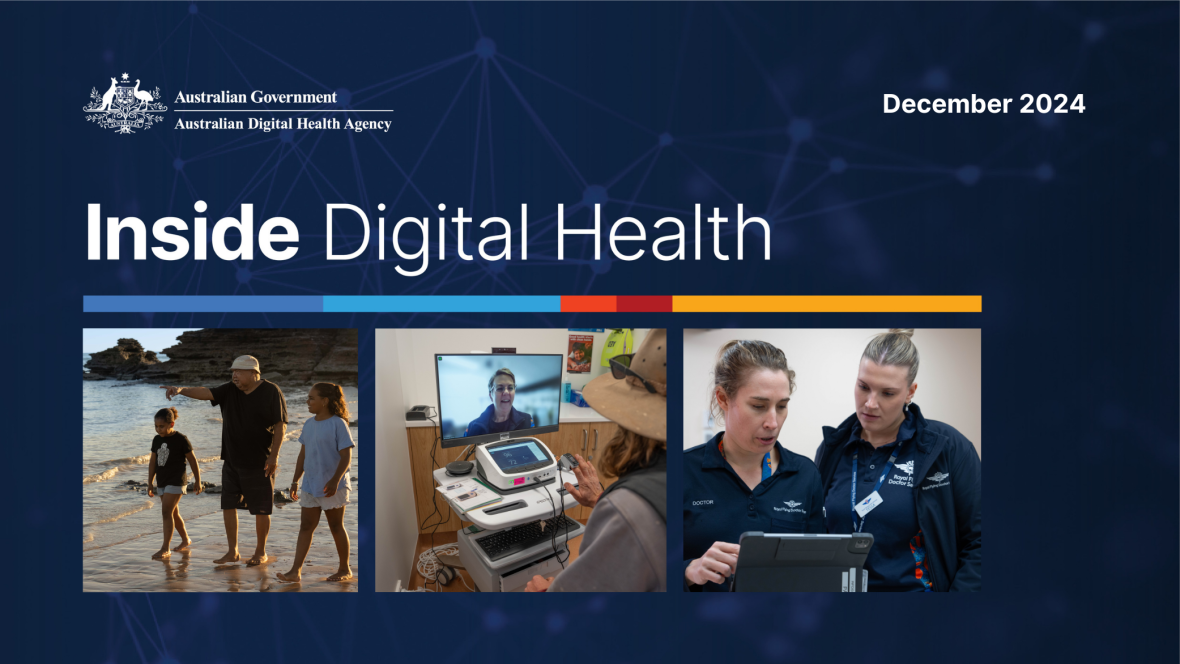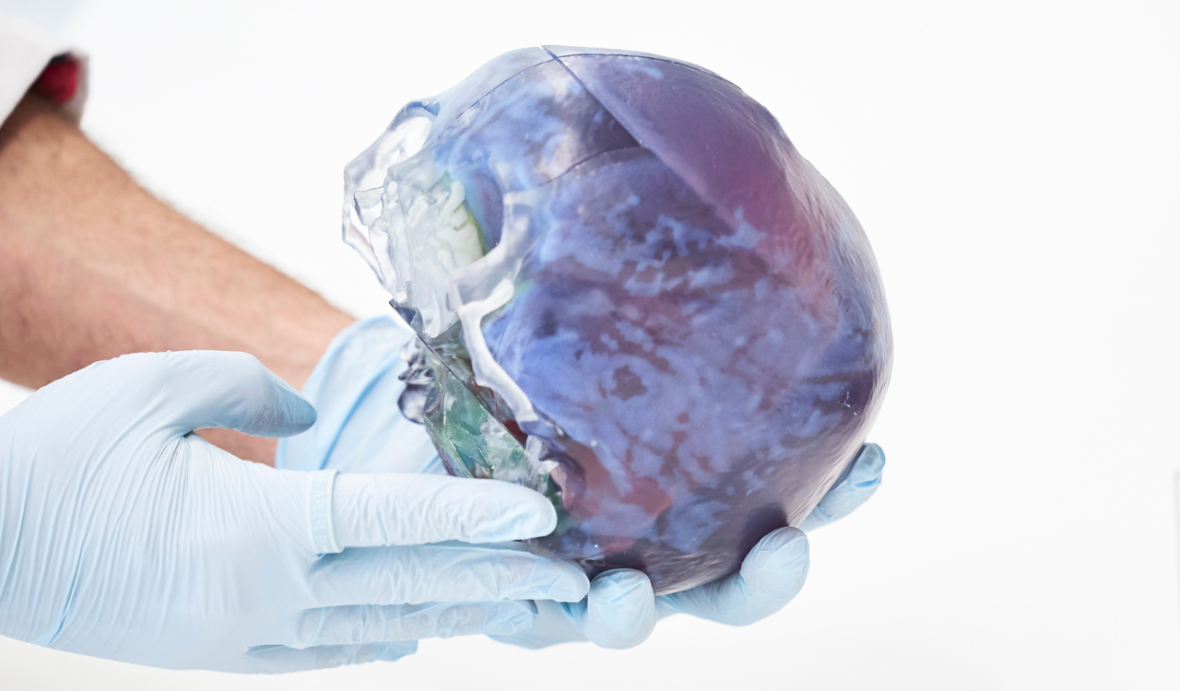
Welcome to the December edition of Inside Digital Health – our last edition for the year.
This month we've got the details about the latest update to my health app, Lifeline Australia shares advice on seeking mental health support over the holidays, and we’re highlighting new research that will help you beat the heat in any weather.
We also want to say thank you to our Inside Digital Health subscribers. We have appreciated your support of our newsletter this year and wish you a safe holiday season.
What do you want to read in 2025? Let us know by emailing social@digitialhealth.gov.au or leaving a comment on LinkedIn.
Subscribe to Inside Digital Health on LinkedIn
my health app update the first stop for a healthy holiday
As the holiday season approaches, millions of Australians will hit the road, skies and seas to celebrate Christmas and enjoy some much-needed downtime.
Amid the excitement, keeping your health information accessible and secure is essential - especially when you’re far from home.
New features in my health app will help Australians manage their health and wellbeing wherever they travel over the holiday season.
The Australian Digital Health Agency has released a significant update to the app that allows users to manage all their active prescriptions, or scripts, in one place.
This change will end the inconvenience and cost of misplacing electronic tokens or paper prescriptions.
Agency CEO Amanda Cattermole PSM said the latest update to my health app enables Australians to manage electronic prescriptions alongside their individual key health information in a secure and convenient location.
'Australians caravanning across the country or flying to family festivities should download my health app before they travel, so their health information and tools to support them are always in reach,' Ms Cattermole said.
'Whether you are a busy parent, an interstate traveller or someone with chronic or complex health conditions, the upgrade to the my health app has been designed and tested with diverse consumer groups to ensure it is a health saver for everyone.'
Ahead of the holiday season, there are steps you can take to ensure you have secure access to your health information wherever you are.
Agency Chief Clinical Adviser (Medicine) Dr Amandeep Hansra said my health app is increasingly useful when people are in emergency situations.
'Diagnostic imaging and pathology reports are being shared to My Health Record in growing numbers, which allows clinicians to access critical information that is not always available in their own organisation's health records. Access to this information on their mobile phone through my health app will also empower consumers to take control of their health,' Dr Hansra said.
The latest upgrade to my health app provides enhanced usability and a fresh look. Additional features include:
- the ability to manually add or edit medicines you are currently taking, allergies and adverse reactions
- options to add, update and view emergency contact information
- options to link or delink an Active Script List (ASL) once registered with a pharmacy
- updates to the organ donor status information
For more information visit our website or download my health app for iOS or Android from the Apple App Store or Google Play Store and follow the prompts.

Beat the heat in any weather
As temperatures rise, new research has provided insights on how to stay cool. A study from the University of Sydney and the Montreal Heart Institute found weather conditions affected the type of cooling strategy that works best.
In hot and humid weather, using a fan – with and without skin wetting – reduces cardiac strain in older people. However, in very hot and dry conditions, fan use had an adverse effect, but wetting the skin on its own was effective at keeping people cool.
3D printing supports surgical innovation
Researchers are working towards making patient-specific 3D printed models that can recreate how body parts feel and move to enable clinicians to practise specific surgery techniques.

Biomedical engineers at UNSW’s Tyree Foundation Institute of Health Engineering (IHealthE) have made geometrically and anatomically accurate 3D printed models, including of a young child’s skull, which helped surgeons plan how to successfully remove a life-threatening tumour. 'I think the future in this space is using even more realistic materials during the 3D printing process and therefore understanding how parts of the body are actually going to bend and flex during surgeries,' UNSW’s Dr Keng-Yin Lai said.
National body to drive genomic research
A new national body, Genomics Australia, will be established from 1 July 2025 to better integrate cutting-edge genomic research and technology into the health system. Genomic medicine uses a person’s DNA to better identify disease risks, prevent illness, make earlier diagnoses and personalise treatment. One of Genomics Australia’s priorities will be to improve access to personalised cancer care.

Digital health support over the holidays
The holiday season can be a difficult time for many people. Lifeline Australia, a national charity that provides crisis support and suicide prevention services, highlights some of the tools and resources available to help navigate this time of year.
If you find the holiday season challenging, you’re not alone. In fact, the Christmas period is Lifeline’s busiest time of year. Last December, Lifeline received an average of one call every 30 seconds. Across its phone, text and chat crisis support services, it received almost 150,000 contacts.
The holidays are often depicted as a time of joy, celebration and togetherness, but for many of us, they can bring up a range of difficult thoughts and feelings.
In particular, loneliness is experienced by many people at this time of year. It is important to understand that the experience of loneliness is not the same as being alone. It is possible to spend time in seclusion in the bush and not feel lonely. Equally, you can be surrounded by familiar faces at a vibrant party yet still feel completely isolated.
If you’re feeling lonely right now and want to explore some options for what you can do about it, Lifeline has a toolkit full of tips and resources to help provide support.
Reaching out to someone you already know can be intimidating and hard but is also the shortest route to authentic connection. Keep in mind most people appreciate it when an old friend or former colleague reaches out to say hello. If they don’t reply, or don’t want to connect, don’t be disheartened, it’s likely more of a reflection of their busyness than it is on you.
Another great way to make social connections is to consider joining a club, organisation or online community. If these are not realistic options right now, there are several strategies that can be effective, such as creating a plan to keep yourself engaged and occupied. This can look like scheduling activities, spending time outdoors and practising self-care when you find yourself alone.
It is essential that no one feels they must face their most difficult moments alone. Lifeline is available 24 hours a day, 7 days a week and ready to listen, support and provide guidance whenever needed and whichever way suits you best, via the phone line on 13 11 14, text on 0477 131 114 or the webchat and toolkits at lifeline.org.au.
- Lifeline’s guide to mental wellness during the holiday season
- Lifeline’s tools and apps for loneliness

My Aged Care integrated with My Health Record
My Aged Care support plans can now be shared with healthcare providers through My Health Record. When a person has an aged care assessment, the assessor will ask if they authorise sharing their support plan to My Health Record.
Access to support plans will give healthcare providers a better understanding of their patients’ needs and the aged care support they qualify for as well as and helping providers make quicker and more informed treatment decisions. Support plans created before 9 December cannot be made available in My Health Record. Find out more at the Department of Health and Aged Care’s website.
C3.0 2025 Summit
The C3.0 Connect. Care. Confidence. 2025 Summit on 18 February will bring together leading innovators, service providers, expert clinicians and consumers for a day of panel discussions, case study presentations and Q&A sessions. Presenters from Australia and around the world will focus on building strong and effective clinical governance in the digital health space.
Co-hosted with the Australian Commission on Safety and Quality in Health Care, the summit will build on the 2023 Summit and is a must-attend event for anyone involved in the planning, implementation, evaluation and use of digital health services and tools. If you’re interested in the latest news and insights on Generative AI, supporting digitally enabled care and delivering person-centred services, register now for this free virtual event.
Register for the C3.0 2025 Summit.

If you’re looking for a role that’s professionally and personally rewarding and offers career growth and mentoring, check out the latest jobs at the Australian Digital Health Agency.
- Assistant Director, Conformance and Assurance – applications close 2 January, 12 am (AEDT)
- Senior Clinical Information Modeller – applications close 2 January, 12 am (AEDT)
- Cyber Project Manager – applications close 5 January, 11 pm (AEDT)
- Lead Cyber Compliance Officer – applications close 5 January, 11 pm (AEDT)
- Assistant Director Technology Assets, Contracts and Procurement (Finance Manager) – applications close 5 January, 11 pm (AEDT)
- Support Analyst – applications close 5 January, 11 pm (AEDT)
- Cyber Security Analyst – applications close 5 January, 11 pm (AEDT)
- Cyber Threat Intelligence and Threat Hunt Manager – applications close 5 January, 11 pm (AEDT)
- Compliance and Assurance Advisor – applications close 5 January, 11 pm (AEDT)
- Digital Educator – applications close 5 January, 11 pm (AEDT)
- Branch Support Officer – applications close 6 January, 12 am (AEDT)
- Solutions Architect – applications close 6 January, 12 am (AEDT)
- Director, Integrity – applications close 8 January, 12 am (AEDT)
- Web Content Producer – applications close 9 January, 12 am (AEDT)
- Connections Support Lead – applications close 9 January, 12 am (AEDT)
- Project Support Officer – applications close 12 January, 11:30 pm (AEDT)
- Analyst – applications close 13 January, 12 am (AEDT)
- Manager, Strategic Engagement – applications close 19 January, 11 pm (AEDT)
- Product Manager – applications close 10 January, 12 am (AEDT)
- Senior Lawyer – Register of Interest – applications close 28 February, 11 pm (AEDT)
- Temporary Employment Register – always open
- APS Section 26 Transfer - Permanent and Temporary - Employment Register – always open
See more vacancies on our careers page.

The world of digital health evolves in a heartbeat. Help us stay on the pulse by sharing your thoughts, news and ideas.
Email: social@digitalhealth.gov.au
Subscribe: To keep up to date with digital health news, events and more.
Follow: Like, follow and join the digital health conversation.
